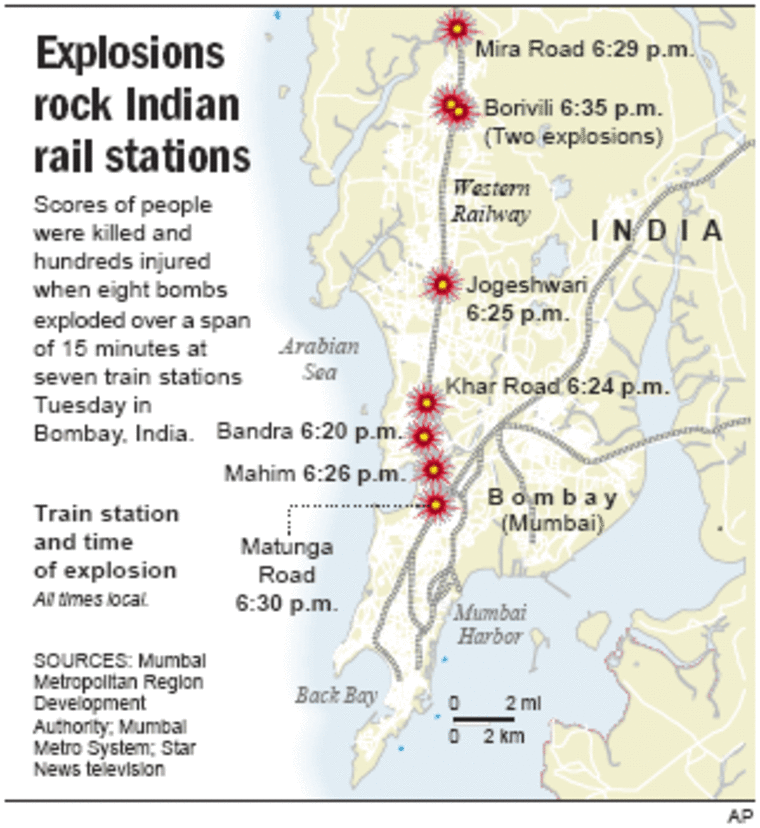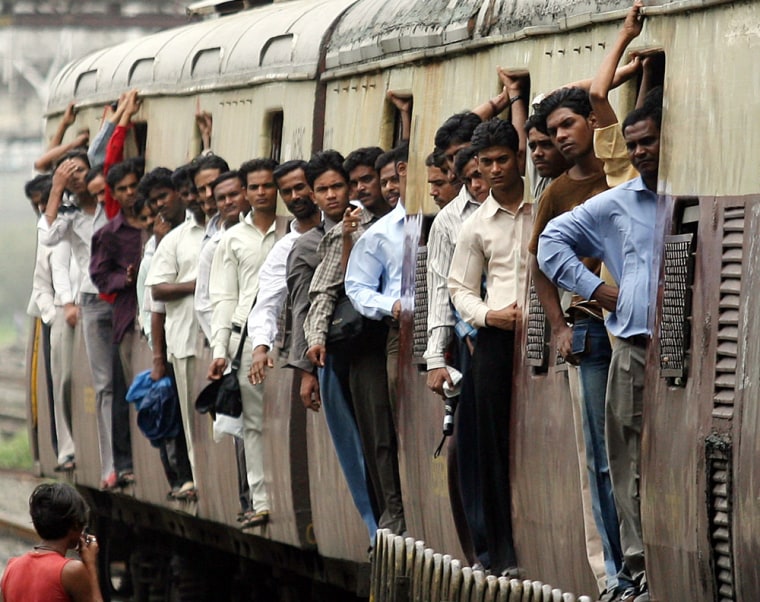Prime Minister Manmohan Singh praised this wounded city for its strength Wednesday, vowing that “no one can make India kneel,” while a senior investigator said the Mumbai train attacks that killed at least 200 people could be linked to a Kashmiri militant group.
A Foreign Ministry official demanded that Pakistan dismantle all terrorist networks on land it controls — but fell short of directly accusing India’s nuclear-armed rival for the attacks.
Singh highlighted the achievements of this city of 16 million, which staggered back to life despite attacks on the commuter train network Tuesday that killed at least 200 people and wounded more than 700.
“Your resilience and resolve will triumph over the evil designs of the merchants of death and destruction,” Singh said in a televised speech. “Let me say again, no one can make India kneel. No one can come in the path of our progress.”
Eight bombs ripped through packed trains at rush hour, stunning a city that sees itself as the embodiment of India’s global ambitions, where the country’s business community and entertainment world come together. The number of dead has risen steadily as rescuers have found more bodies and people died of their injuries.
Investigators picked through the mangled ruins of train cars, placing evidence in blue plastic bags beneath an overcast monsoon sky.
“We are just trying to establish what kind of explosives were used and where exactly the bombs were placed, but it appears they were kept in the luggage racks,” said police inspector Yeshwant Patil.
Plastic explosive used?
P.S. Pasricha, director general of police for Maharashtra state, earlier dismissed Indian media reports that the powerful plastic explosive RDX was used in the attack, saying investigators were awaiting the results of forensic tests.
Pasricha said investigators were looking into a possible link with Lashkar-e-Tayyaba, a Kashmiri militant group that has denied playing a role in the bombings.
“It is difficult to say definitely as this stage, but Lashkar-e-Tayyaba can be involved going by the style of attack,” Pasricha said.
Lashkar has previously carried out near-simultaneous explosions, according to Indian authorities, who blamed the group for bombings in New Delhi that killed 60 people last year.
Other Indian officials, speaking on the condition of anonymity because the inquiry was just beginning, cautioned it was too early to accuse a specific group.
A spokesman for Lashkar, Abdullah Ghaznavi, denied the group was involved, saying “Indian security forces blame Lashkar in an attempt to defame Kashmir freedom struggle.”
By Wednesday night, R. Patil, deputy chief minister of Maharashtra state, said 200 people had died. Officials said more than 700 people were wounded.
In his speech, Singh noted many people quickly returned to their normal routines, saying, “This is living proof of our contempt for terrorism.”
Slowly, Mumbai rebounds
The stock market rose 3 percent Wednesday. While morning trains were far less crowded than usual, the rail network was increasingly jammed as the hours passed.
“It’s not like a normal day yet,” said Farhan Khan, a 17-year-old student waiting for a train at Bandra station, near the site of one blast. “But wait until the end of the week, then it’ll be just like every day. ... This is a strong city.”

In years past, terrorist attacks almost immediately brought Indian accusations of Pakistani involvement. But with India and Pakistan working through an often-rocky peace process, Indian officials have been hesitant to blame Pakistan.
Many Indians, however, suspect the attacks were the work of Kashmiri militants who New Delhi charges are trained, armed and funded by Islamabad.
Pakistan, which condemned the bombings, insists it only offers the militants diplomatic and moral support.
Kashmir — a Himalayan region divided between the two neighbors but claimed by both — is largely Muslim, and the militants want a Kashmir independent of India, which is mostly Hindu, or joined to overwhelmingly Muslim Pakistan.
Indian Foreign Ministry spokesman Navtej Sarna on Wednesday repeated Indian demands that Pakistan crack down on the militants, who New Delhi says operate from Islamabad’s part of Kashmir.
Pasricha said that in recent months authorities had become aware Mumbai could be targeted.
“We had an idea since some months that Bombay was a target,” he told reporters, using Mumbai's previous name. “Since it is the financial capital, there are many vulnerable areas.”
